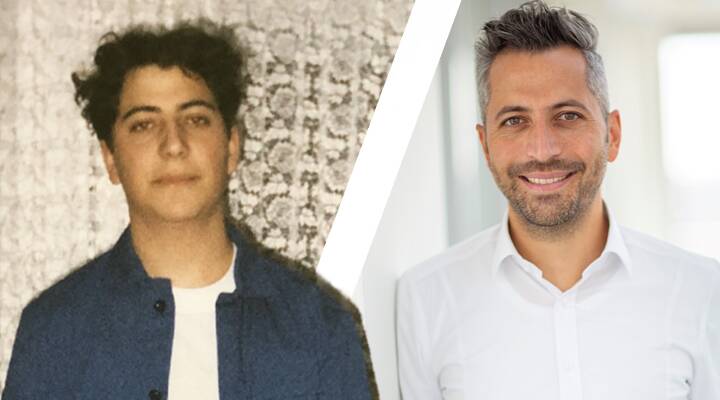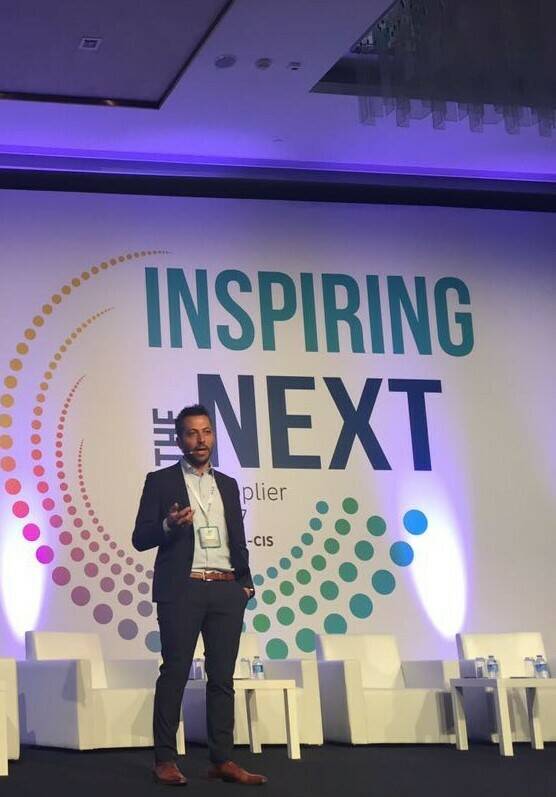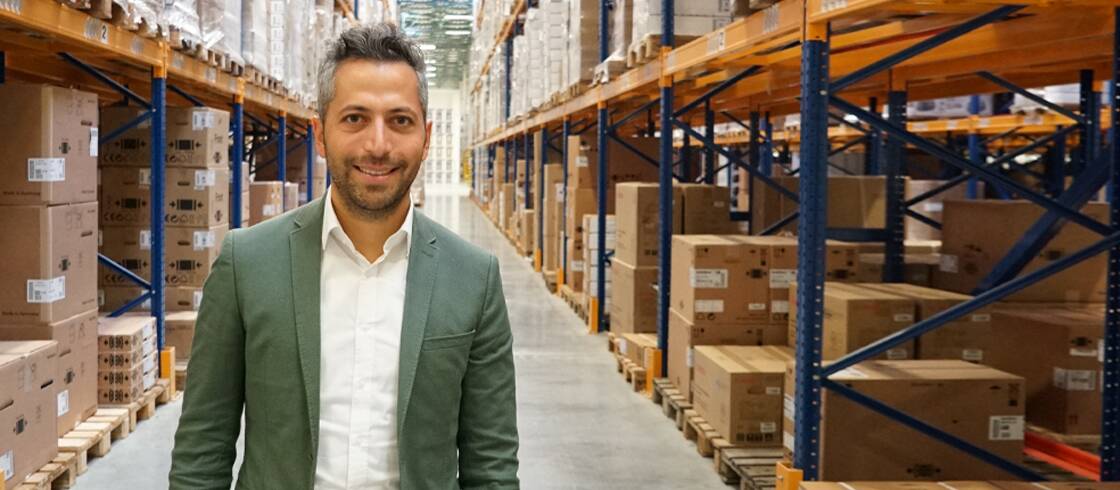From the Production Line to Management Level
Reading time for this article: 9 minutes
Ayhan Oran has achieved what many dream of. He worked his way up from the assembly line to the executive level at BSH. In the interview, you can learn how he did it and what he would like to share with others.
Ayhan, what position do you currently hold at BSH?
Since the last 2 years, I’m leading the Global Material Supply Planning team. We ensure the material availability for the production of all BSH sites. We are managing more than 2,000 suppliers and about 80,000 material codes across all Production Countries in the BSH Regions.
That sounds like a position with a lot of responsibility. Could you please give us a brief description of your career up to this point?
I am 41 years old, born in Heidenheim an der Brenz and I have a multicultural background. My parents came from Turkey to Germany 50 years ago.
At the age of 16, I started an apprenticeship for industrial mechanics at the BSH Site Giengen and continued in the factory afterward. In the following years, I worked in various areas of production, e.g. as an operator in the assembly line and fabrication, as a forklift driver, or as a painter in the rework area. Over the years, luckily, my leaders have supported me in harmonizing my further educations with my daily work, which helped me grow.
After spending more than 4 years in production, I was promoted to the position of project employee - with my own desk and email address. That was a big milestone for me!
Shortly afterward, I joined the engineering department as a specialist. I was now responsible for the introduction of BSH Production System at Assembly. That motivated me to invest in further training. At the same time, I was working on improving my Turkish and English. Foreign languages are very important, especially if you are looking for an international career.
In 2009, I switched to the “Supply Chain” department for the Refrigeration Product Division. There, I had the opportunity to work in a global network. I got the chance to position myself in the department as an expert for global material planning.
My next goal was to develop myself into a leadership role. My drive was to move things, work out concepts, and implement them. In 2015, I was appointed as Group Leader for Global Material Planning for the refrigeration factories.
After just 2 years, my journey continued abroad. In 2017, I moved to Turkey as head of the Demand and Supply department for Region T-MEA-CIS (Turkey, Middle East, Africa, and CIS countries). An exciting and informative time began in a very challenging and dynamic environment.
At the beginning of 2020, it was time for me to return to Germany and take on my new role in the region of Europe.
What were the biggest hurdles in your career and how did you overcome them step by step?
One of the hurdles was that at the age of 16, I did not know what I really wanted to do professionally. That is why at first, I accepted an apprenticeship for which I was qualified. Over time, I became more conscious of my strengths and realized that it was not the right job for me. However, the biggest hurdle and question for me was how I could step out of this position.
For many roles, the entry ticket was a university degree - I did not have that. Interrupting my employment was also not an option for me. Therefore, I decided to take part in further training in Technical Management at the Chamber of Industry and Commerce in addition to the job. However, even with this qualification in my pocket, I often had to struggle with the prejudice that I come from manufacturing and do not have a university degree.
I also realized quite early that I needed a network that would support me. The question was how to develop a network? How to find someone who believes in you and stands up for you? Identifying someone as a “stakeholder” and gaining their trust was a challenge.

Where do you find someone who sees "more" in you and who supports you as a kind of mentor? Do you have a concrete tip here?
With my 41 years, I think I have the answer to that. Today, I am a little bit smarter (laughs). What is important in my point of view: A mentor will not find you. You should find him or her. That is the basic rule.
Talking to leaders who don’t know you takes a lot of courage. Sympathy to each other and strong enthusiasm are further important factors. Mutual understanding, trust, and appreciation are the basis for a good start.
One option is to look for a kind of “common ground,” for example, someone who also has made a career through alternative paths. A potential mentor can also be someone who made a positive impression on you in meetings, or with whom you already enjoyed working on a project.
Then it is time to be brave and seek conversations. Rejections in this process are quite normal, but at some point, you will find a person who fits to you.
So keep at it! What do you think a company can do to make the chances of promotion at least somewhat more equal for ambitious employees?
Startups are good examples. They prefer to focus on individual strengths when they recruit. Soft skills like emotional intelligence, empathy, the ability to inspire people and adaptiveness to rapidly changing conditions are also more valuable than holding certificates.
Everyone who wants to develop him or herself and show a willingness to take responsibility should get the chance to do so. Companies could take a closer look at this by the selection process and then support ambitious employees individually.
I personally pay attention to new employees, whether they have a certain passion for the job - I also call it “hunger”. In addition, trust is important for me. Also, not to forget, to have fun at work.
What can an internationally active company like BSH do to ensure that young people around the world have good opportunities to "work their way up"?
I think it is important to empower leaders to be attentive, especially by the selection of applicants for certain positions. The employees who can best contribute to the company's results do not necessarily have to be the ones with the best grades. Leaders should be able to recognize real talents and look for individual strengths. I, therefore, recommend focusing on strengths rather than weaknesses. Both are important, but in my experience, working in areas where someone is already strong is much more promising.
For example, for me, it was languages, ability to network, and open-mindedness. That is why I have tried to focus my “Unique Selling Point” clearly on internationality and cultural diversity. This is a clear advantage, especially in global departments.
I proceed in a similar way while recruiting new employees. I try to identify strengths and find out a way that people can use their potential best in order to be able to contribute to their personal development and to the success of the company.
What would you like to pass on to someone who is currently in a similar situation as you were back then?
I only can encourage you to be strong. I can well remember my time in production and the conversations during the breaks. Some of my colleagues accepted their current position as a “final destination” rather than an intermediate step in their personal career. If the hurdles are more in the foreground than the opportunities, there is a risk that you believe it as well.
However, these conversations motivated me to prove to everyone that the future is in your own hands and that you can always develop yourself, no matter where you are right now.
Therefore, I would really suggest to anyone who is in a similar situation to not give up under any circumstances and to not listen to everything others say to you. Of course, honest and helpful feedback should be taken seriously. However, you always set the limits of your own development opportunities yourself.
I would also recommend everyone find a mentor. In my opinion, there is no need for an official framework for this. I always kept looking for inspiring people who were role models to me. But how and where did I find them for myself? For example, in meetings and projects, I paid attention to open-minded people with good ideas, asking powerful questions, and good conversational skills.
I remember a colleague from purchasing, who was great at negotiating and speaking native English. I simply joined these conversations and listened carefully. This way I was able to improve my English significantly. You should always stay curious and use every chance to learn.
Are you a mentor yourself now? It sounds like you have a lot of enthusiasm for the subject.
Indeed, I have some mentees and I have completed my first coaching and mentoring training.
My enthusiasm for mentoring began in Turkey, where many colleagues approached me and asked for recommendations for their career planning and personal development. It has always been important to me to initiate self-reflection and let the people know that they self are responsible for shaping their future.
At the same time, I had a good team with a strong performance, which was based on a climate of empowerment, appreciation, and freedom in decision-making. In my opinion, creativity and trust produce much better work results. This has a positive effect, both internally and externally.
At BSH in Turkey, we also initiated an individual mentoring program for the supply chain leaders with the goal to strengthen the coaching/mentoring approach. It is important that managers understand the differences in coaching/mentoring and apply the techniques in the leadership role.
However, even if mentoring is institutionally established in the company, I think it is important, as I said, that the mentee should contact the mentor and not the other way around. That is the first important step and shows a certain motivation.

What's next for you? What are your plans for the future?
Thriving in my current role brings me joy, but there's still much to be done. We faced challenging times during the Corona and Chip-Crises, but we've used those experiences to reshape our organization and prepare for the future. Our new way of working reflects the need for agility in a rapidly changing environment, with transparency, quick response times, fast decision-making, speedy execution, and a willingness to take risks.
Meanwhile, I continue to serve as a Coach/Mentor and pursue further training in this area. Modern leadership requires self-reflection and recognizing core strengths, going beyond technical knowledge and experience. I believe our company has untapped potential, and I'm passionate about discovering hidden talents, helping people find their ideal roles, and preparing the next generation of leaders. That's why, I'm part of the BSH talent program, Talentify, where I support others on their Talentify journey. My ultimate goal is to foster the growth of a new generation of exceptional leaders.
Is there anything you wish you had said to yourself 25 years ago?
It is simple: keep going, it will work out. Moments of rejections are quite normal and it's also okay to think about giving up for a moment. Nevertheless, it is important to keep going and believe in your strengths. Do not lose sight of them. Moreover, I would show my 25-year-old self a photo and say, "Believe in yourself, look for your opportunities, take the initiative, use the chances and find your mentor in every phase."




